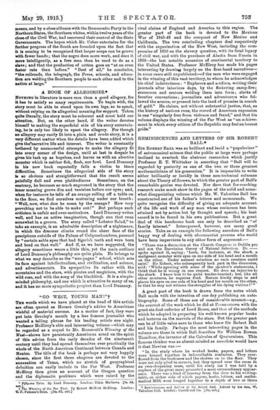A. BOOK OF ALLEGORIES.* Noenrso in literature is more rare
than a good allegory, for it has to satisfy so many requirements. To begin with, the story must be able to stand upon its own legs, so to speak, without relying on its allegorical meaning for support. Taken quite literally, the story must be coherent and must hold our attention. But, on the other hand, if the writer devotes himself to making the superficial side of his story entertain- ing, he is only too likely to upset the allegory. For though an allegory may easily fit into a plain and crude story, it is a very different matter when the details have been added which give the narrative life and interest. The writer is constantly bothered by unsuccessful attempts to make the allegory fit into every corner of the design, until at last in despair be gives his task up as hopeless, and leaves us with an abortive monster which is neither fish, flesh, nor fowl Lord Dunaany in his new book repeatedly falls a victim to these difficulties. Sometimes the allegorical side of the story is so obvious and straightforward that the result seems painfully dull and even platitudinous Sometimes, on the eontmry, he becomes so much engrossed in the story that the inner meaning grows dim and vanishes before our eyes; and, when for instance he tells of an orange rolling off a table on to the floor, we find ourselves muttering under our breath: " Well, now, what does he mean by the orange P How very provoking not to be able to make out!" But perhaps such criticism is unfair and over-meticulous. Lord Dunsany writes well, and has an active imagination, though one that runs somewhat in a groove. The story called "Lobster Salad," to take an example, is an admirable description of a nightmare, in which the dreamer climbs round the sheer face of the precipitous outside of the Palace of Colquonhombros, pursued by "certain sable apes that had tigerish teeth and were born and bred on that wall." And if, as we have suggested, the allegory sometimes wears a little thin, yet the main outlines of Lord Dnnsany's philosophy are quite plain. He belongs to what we may describe as the "neo-pagan" school, which sets its face against intellectualism, and civilization, and science, and advertisements. Its sympathies lie rather with the mountains and the stars, with pirates and magicians, with the wild rose, and with the song of the blackbird. It is a simple. minded philosophy, and one which is attractive to many of us, and it has no more sympathetic prophet than Lord Dunsany.


































 Previous page
Previous page